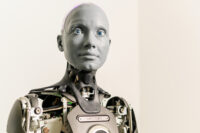Surveillance in the digital age is a universal reality at unprecedented scale, reaching into the intimate details of uncountable millions of individual lives. Now politely called “data-mining” to lessen it’s sense of violation, we used to call such activity espionage or spying and its “Peeping Tom” practitioners “spooks” in recognition of the creepiness of spying on others. An unseemly activity so ubiquitous by necessity employs the antiseptic language of business to give it an air of legitimacy; such is the instrumentality of the surveillance society in which we now live.
What once were espionage methods used by governments against “enemies” and by corporations against competition have been turned inwards instead. In the name of “national security,” tens of thousands of employees, and untold billions of dollars are being used to monitor citizens’ personal and presumably private lives. The product of this vast array of digital technology and spying activity is stored and accessed in data-centers running 24-hours a day, by both governmental and corporate entities spanning the globe. In a sense, each of us have been assigned an algorithmic assisted “baby-sitter/data-analyst” who watches over every detail of our lives looking for patterns. This begs the question: who is baby-sitting the baby-sitters?
Edward Snowden was one such baby-sitter. A former employee of a corporation under government contract specializing in providing “security” services, he actually had a relatively low-level of clearance and was one of thousands of such employees. Nonetheless he was able to retrieve highly-classified information about the U.S. government’s worldwide spying and surveillance programs. His revelations have rocked the world community as one detail after another has come to light. Our globe-spanning “security” system even bugged the private cell phone of our ally the Prime Minister of Germany, Angela Merkel.
In George Orwell’s fictional world of “1984” systemic, all-pervasive spying and surveillance supports Big Brother’s State of Oceania. Citizens are required to monitor and report on each other, children to spy on their parents. “Thought crime,” the mere idea of stepping outside approved parameters of behavior, is illegal. Those arrested are subjected to “reeducation” aimed at correcting their “defects” and then returned to society as compliant citizens. In our real world of 2014, your email never gets deleted and face-recognition software logs your public activity.
The government and the corporations will not tolerate more traitors or whistleblowers (depending upon one’s point of view) such as Edward Snowden. But like Orwell’s Oceania, our spying apparatus does not work unless everyone is under the threat of constant observation. Thus each baby-sitter has a baby-sitter, who now in turn has a baby-sitter, ad infinitum. In penal history, this was perfected in Jeremy Bentham’s 18th-century design for the Panopticon, a prison designed so that each inmate believed he was being observed; mere suspicion of surveillance is enough to prevent infractions.
Supreme Court Justice Scalia has said privacy per se is not a right guaranteed by the Constitution for activity that extends beyond the boundary of one’s home, including online communication. His conservative definition does not bode well for those who object to having the habits and conduct of their lives subject to spying and surveillance, either for political or commercial purposes.
Big Brother is watching you…but who, it must be asked, is watching Big Brother?




